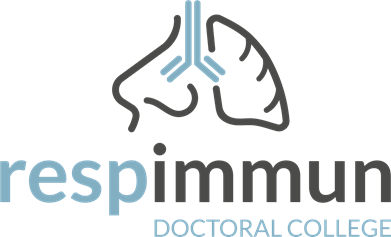
Heinemann ⏩
• Höfler
• Kargl
• Kwapiszewska
• Leithner
• Marsche
• Marsh
•
• Olschewski A
• Strobl


The RESPImmun Faculty

|
Ákos HEINEMANN, MDShort chain fatty acids and pulmonary endothelial function |
|
Division of Pharmacology, Otto Loewi Research Centre, Medical University of Graz,
Neue Stiftingtalstraße 6, A-8010 Graz;
| |
| websites: [RESPImmun] [DK-MOLIN] [MOLMED] | |
| • Profile ⏬ • Curriculum vitae • PhD students • Grants • Publications | |
Ákos Heinemann is an immunopharmacologist who focuses his research on the regulation of leukocyte trafficking as a fundamental principle of tissue inflammation. Recently, he has explored the role of chemokines and eicosanoids in the modulation of immune cell function and has characterized a panel of novel pharmacological tools that served as starting points for the clinical development of anti-inflammatory drugs. His primary aim is to characterize novel mediators and pathways that regulate the function and interaction of endothelial cells, granulocytes and macrophages, and might hence serve as promising therapeutic targets for inflammation including asthma and acute lung injury. Within RESPImmun he closely collaborates with Gerald Höfler (pathology), Eva Böhm, Julia Kargl and Leigh Marsh (animal models), and Grażyna Kwapiszewska and Horst Olschewski (human cell systems / patients samples). He is the coordinator of the MOLIN.
Project
Project 3: Short chain fatty acids and pulmonary endothelial functionCo-PI: Thomas Bärnthaler
Background
Short chain fatty acids (SCFA) such as acetate, propionate and butyrate, are produced in high concentration via fermentation in the human gut by commensal bacteria and are taken up into the bloodstream. SCFA have been shown to have strong anti-inflammatory properties by the production of mediators like PGE2 and inhibition of cytokine release. Accordingly, allergic germ-free mice show exaggerated airway eosinophilia and increased levels of TH2 cytokines when compared to recolonized mice and nutrient fiber content strongly correlates with the extent of allergic inflammation and lung eosinophilia, which was also alleviated by treatment with propionate in a mouse model of house-dust mite allergy. SCFA are natural ligands for the free fatty acid receptors FFA2 (GPR43) and FFA3 (GPR41), which belong to the family of seven transmembrane spanning G protein-coupled receptors. SCFA have also been shown to regulate gene transcription via the inhibition of histone deacatylase (HDAC) activity. Their anti-inflammatory properties are at least partially mediated by NFκB inhibition and subsequent repression of related cytokines.Hypothesis and objectives
Based on preliminary data from our laboratory we hypothesize that SCFA are capable of regulating endothelial function which translates to an anti-inflammatory action. We will further characterize the effects of SCFA on pulmonary microvascular and arterial endothelial cells regarding barrier function, expression of adhesion molecules, intracellular signaling pathways and interaction of the endothelium with immune cells. Proof-of-concept studies will be performed in diverse mouse models of asthma and asthma exacerbations.Methodology
Year 1: The PhD student will learn how to isolate leukocytes from peripheral blood of human volunteers and patients and how to cultivate endothelial cells from lungs. FFA2 and FFA3 expression will be quantified by real-time PCR, Western blot, fluorescence microscopy and multi-colour flow cytometry. Year 2: Endothelial barrier function will be investigated by electrical impedance measurements (ECIS), transendothelial diffusion assays, VE-cadherin / actin staining of monolayers and systems of isolated whole lung perfusion. Cytokine profiles will be determined by multiplex ELISA. Lipid mediators will be determined by LC-MS. Year 3: Moreover, the student will investigate the role of SCFA and their receptors in experimental mouse models for allergic asthma and non-allergicInput from collaborations within the RESPImmun programme
- Horst Olschewski will recruit patients and collect blood samples.
- Grażyna Kwapiszewska will support the project with her expertise in lung physiology and cell signaling,
- Julia Kargl will support the project with complex flow cytometry measurements,
- Gunther Marsche will support with biochemical assay,
- Andrea Olschewski with in vivo cell calcium imaging,
- Leigh Marsh ill support the student in experimental mouse models of allergy and
asthma (
Fra-2 TG animals), - Christine Moissl-Eichinger will support the project with microbiome expertise.